Leadership and Management for Service Industries: Trailfinders Report
VerifiedAdded on 2021/02/20
|16
|5252
|322
Report
AI Summary
This report delves into the intricacies of leadership and management within the service industry, using Trailfinders, a British travel company, as a case study. It begins by outlining classical management theories like scientific, administrative, and bureaucracy theories, and then explores various leadership styles, including democratic, autocratic, and transactional approaches. The report reviews the importance of talent management in the service sector and evaluates how different management theories and leadership styles facilitate talent management. It also analyzes the internal and external factors influencing management styles and structures, such as stakeholders, employees, and the competitive landscape. Finally, the report compares and contrasts different service industries, providing insights into the application of leadership and management principles across various sectors.
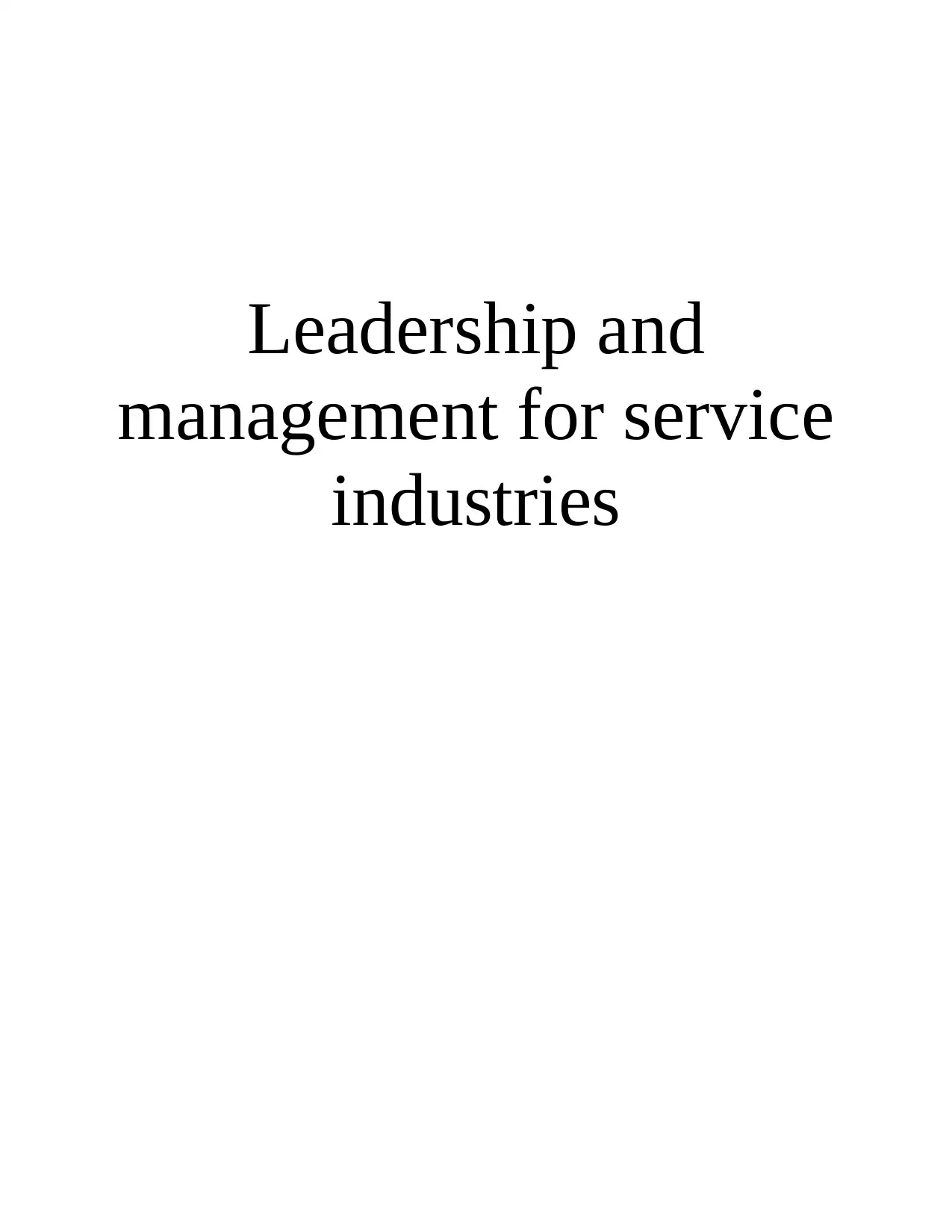
Leadership and
management for service
industries
management for service
industries
Paraphrase This Document
Need a fresh take? Get an instant paraphrase of this document with our AI Paraphraser
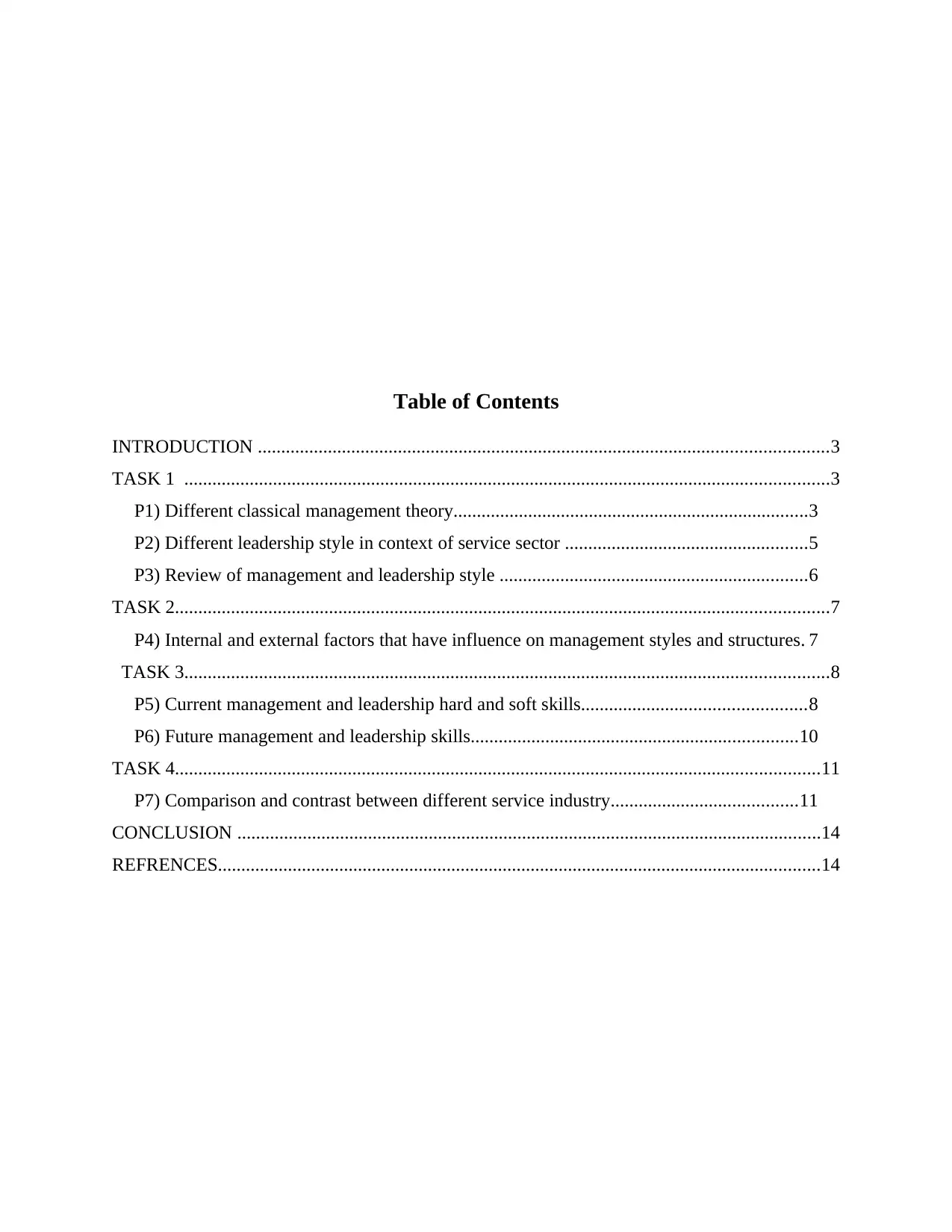
Table of Contents
INTRODUCTION ..........................................................................................................................3
TASK 1 ..........................................................................................................................................3
P1) Different classical management theory............................................................................3
P2) Different leadership style in context of service sector ....................................................5
P3) Review of management and leadership style ..................................................................6
TASK 2............................................................................................................................................7
P4) Internal and external factors that have influence on management styles and structures. 7
TASK 3..........................................................................................................................................8
P5) Current management and leadership hard and soft skills................................................8
P6) Future management and leadership skills......................................................................10
TASK 4..........................................................................................................................................11
P7) Comparison and contrast between different service industry........................................11
CONCLUSION .............................................................................................................................14
REFRENCES.................................................................................................................................14
INTRODUCTION ..........................................................................................................................3
TASK 1 ..........................................................................................................................................3
P1) Different classical management theory............................................................................3
P2) Different leadership style in context of service sector ....................................................5
P3) Review of management and leadership style ..................................................................6
TASK 2............................................................................................................................................7
P4) Internal and external factors that have influence on management styles and structures. 7
TASK 3..........................................................................................................................................8
P5) Current management and leadership hard and soft skills................................................8
P6) Future management and leadership skills......................................................................10
TASK 4..........................................................................................................................................11
P7) Comparison and contrast between different service industry........................................11
CONCLUSION .............................................................................................................................14
REFRENCES.................................................................................................................................14
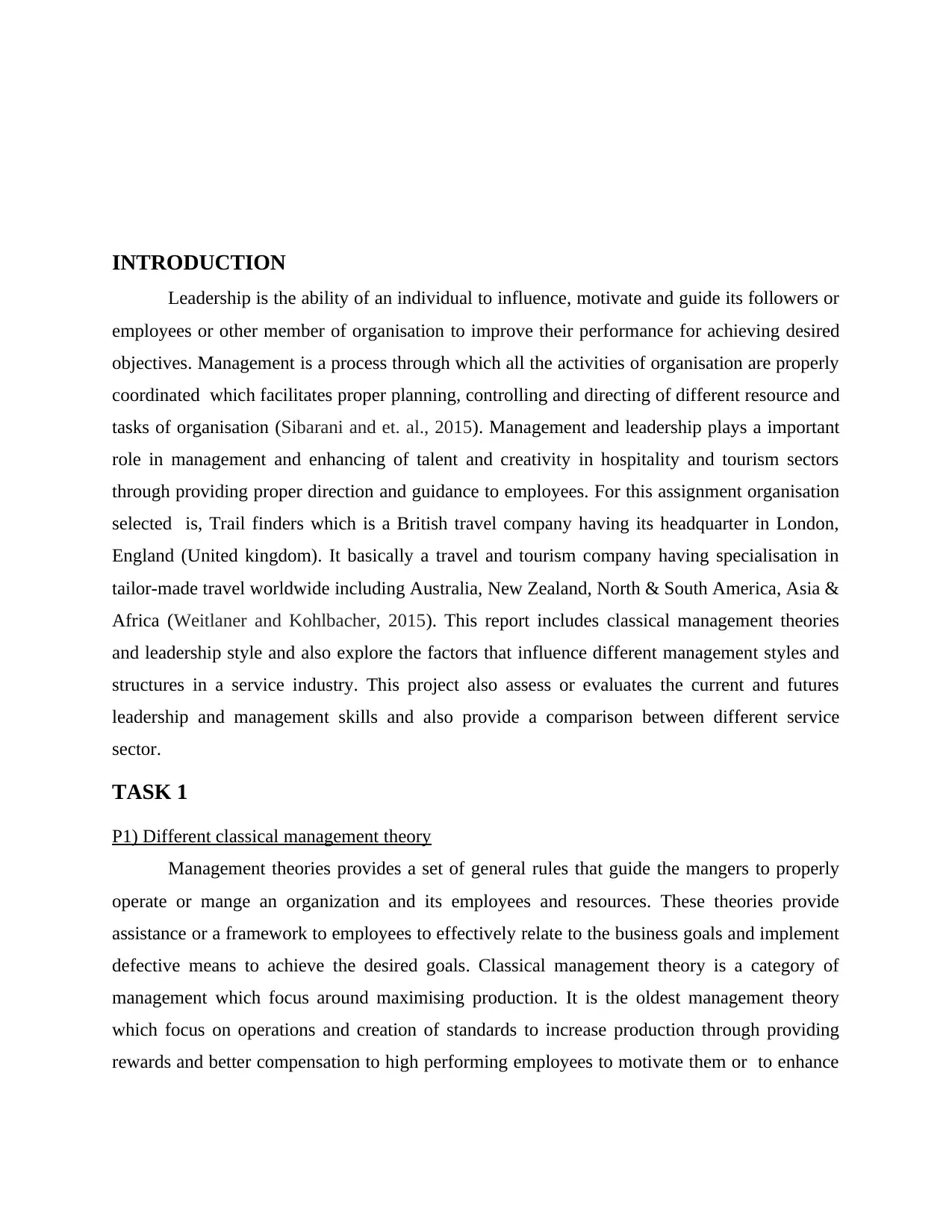
INTRODUCTION
Leadership is the ability of an individual to influence, motivate and guide its followers or
employees or other member of organisation to improve their performance for achieving desired
objectives. Management is a process through which all the activities of organisation are properly
coordinated which facilitates proper planning, controlling and directing of different resource and
tasks of organisation (Sibarani and et. al., 2015). Management and leadership plays a important
role in management and enhancing of talent and creativity in hospitality and tourism sectors
through providing proper direction and guidance to employees. For this assignment organisation
selected is, Trail finders which is a British travel company having its headquarter in London,
England (United kingdom). It basically a travel and tourism company having specialisation in
tailor-made travel worldwide including Australia, New Zealand, North & South America, Asia &
Africa (Weitlaner and Kohlbacher, 2015). This report includes classical management theories
and leadership style and also explore the factors that influence different management styles and
structures in a service industry. This project also assess or evaluates the current and futures
leadership and management skills and also provide a comparison between different service
sector.
TASK 1
P1) Different classical management theory
Management theories provides a set of general rules that guide the mangers to properly
operate or mange an organization and its employees and resources. These theories provide
assistance or a framework to employees to effectively relate to the business goals and implement
defective means to achieve the desired goals. Classical management theory is a category of
management which focus around maximising production. It is the oldest management theory
which focus on operations and creation of standards to increase production through providing
rewards and better compensation to high performing employees to motivate them or to enhance
Leadership is the ability of an individual to influence, motivate and guide its followers or
employees or other member of organisation to improve their performance for achieving desired
objectives. Management is a process through which all the activities of organisation are properly
coordinated which facilitates proper planning, controlling and directing of different resource and
tasks of organisation (Sibarani and et. al., 2015). Management and leadership plays a important
role in management and enhancing of talent and creativity in hospitality and tourism sectors
through providing proper direction and guidance to employees. For this assignment organisation
selected is, Trail finders which is a British travel company having its headquarter in London,
England (United kingdom). It basically a travel and tourism company having specialisation in
tailor-made travel worldwide including Australia, New Zealand, North & South America, Asia &
Africa (Weitlaner and Kohlbacher, 2015). This report includes classical management theories
and leadership style and also explore the factors that influence different management styles and
structures in a service industry. This project also assess or evaluates the current and futures
leadership and management skills and also provide a comparison between different service
sector.
TASK 1
P1) Different classical management theory
Management theories provides a set of general rules that guide the mangers to properly
operate or mange an organization and its employees and resources. These theories provide
assistance or a framework to employees to effectively relate to the business goals and implement
defective means to achieve the desired goals. Classical management theory is a category of
management which focus around maximising production. It is the oldest management theory
which focus on operations and creation of standards to increase production through providing
rewards and better compensation to high performing employees to motivate them or to enhance
⊘ This is a preview!⊘
Do you want full access?
Subscribe today to unlock all pages.

Trusted by 1+ million students worldwide
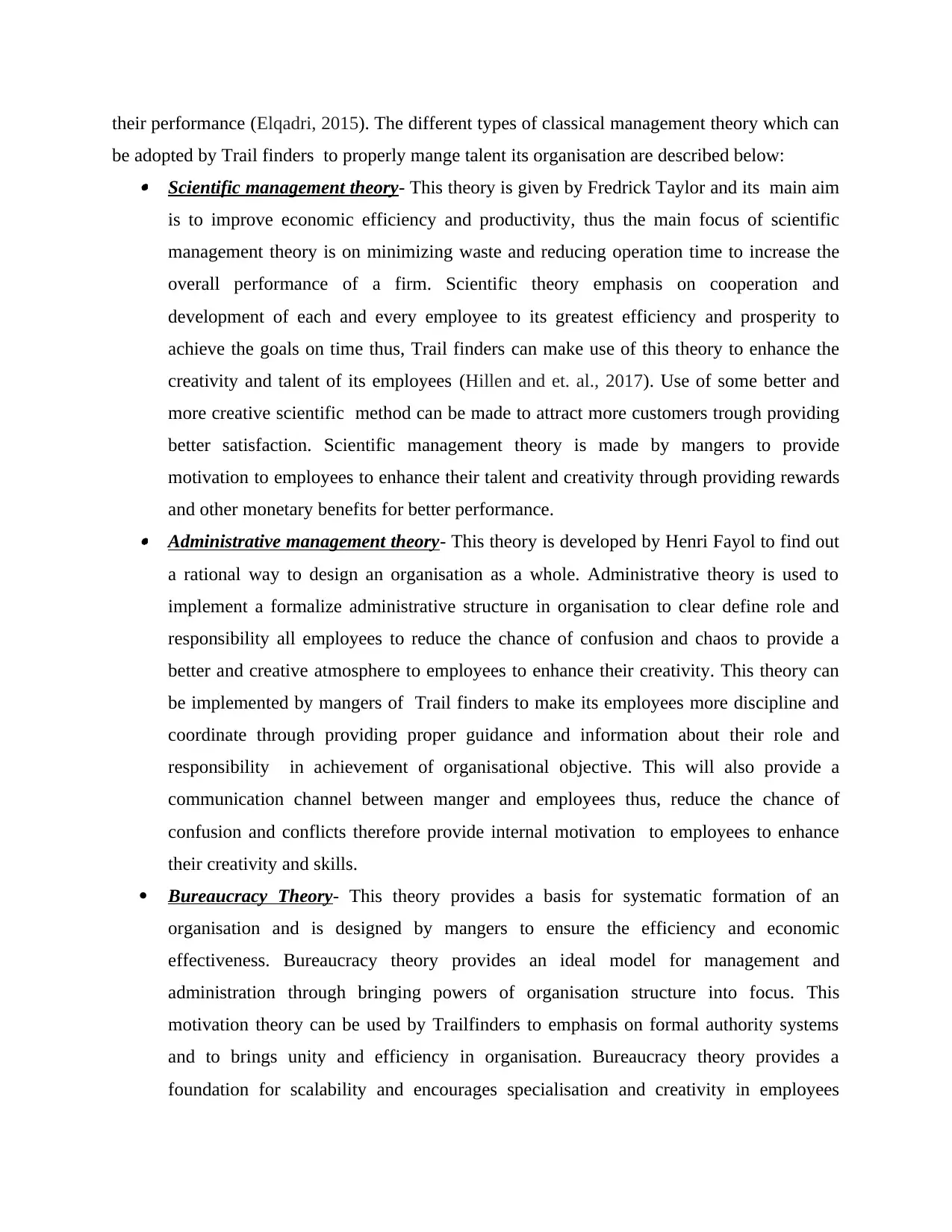
their performance (Elqadri, 2015). The different types of classical management theory which can
be adopted by Trail finders to properly mange talent its organisation are described below: Scientific management theory- This theory is given by Fredrick Taylor and its main aim
is to improve economic efficiency and productivity, thus the main focus of scientific
management theory is on minimizing waste and reducing operation time to increase the
overall performance of a firm. Scientific theory emphasis on cooperation and
development of each and every employee to its greatest efficiency and prosperity to
achieve the goals on time thus, Trail finders can make use of this theory to enhance the
creativity and talent of its employees (Hillen and et. al., 2017). Use of some better and
more creative scientific method can be made to attract more customers trough providing
better satisfaction. Scientific management theory is made by mangers to provide
motivation to employees to enhance their talent and creativity through providing rewards
and other monetary benefits for better performance. Administrative management theory- This theory is developed by Henri Fayol to find out
a rational way to design an organisation as a whole. Administrative theory is used to
implement a formalize administrative structure in organisation to clear define role and
responsibility all employees to reduce the chance of confusion and chaos to provide a
better and creative atmosphere to employees to enhance their creativity. This theory can
be implemented by mangers of Trail finders to make its employees more discipline and
coordinate through providing proper guidance and information about their role and
responsibility in achievement of organisational objective. This will also provide a
communication channel between manger and employees thus, reduce the chance of
confusion and conflicts therefore provide internal motivation to employees to enhance
their creativity and skills.
Bureaucracy Theory- This theory provides a basis for systematic formation of an
organisation and is designed by mangers to ensure the efficiency and economic
effectiveness. Bureaucracy theory provides an ideal model for management and
administration through bringing powers of organisation structure into focus. This
motivation theory can be used by Trailfinders to emphasis on formal authority systems
and to brings unity and efficiency in organisation. Bureaucracy theory provides a
foundation for scalability and encourages specialisation and creativity in employees
be adopted by Trail finders to properly mange talent its organisation are described below: Scientific management theory- This theory is given by Fredrick Taylor and its main aim
is to improve economic efficiency and productivity, thus the main focus of scientific
management theory is on minimizing waste and reducing operation time to increase the
overall performance of a firm. Scientific theory emphasis on cooperation and
development of each and every employee to its greatest efficiency and prosperity to
achieve the goals on time thus, Trail finders can make use of this theory to enhance the
creativity and talent of its employees (Hillen and et. al., 2017). Use of some better and
more creative scientific method can be made to attract more customers trough providing
better satisfaction. Scientific management theory is made by mangers to provide
motivation to employees to enhance their talent and creativity through providing rewards
and other monetary benefits for better performance. Administrative management theory- This theory is developed by Henri Fayol to find out
a rational way to design an organisation as a whole. Administrative theory is used to
implement a formalize administrative structure in organisation to clear define role and
responsibility all employees to reduce the chance of confusion and chaos to provide a
better and creative atmosphere to employees to enhance their creativity. This theory can
be implemented by mangers of Trail finders to make its employees more discipline and
coordinate through providing proper guidance and information about their role and
responsibility in achievement of organisational objective. This will also provide a
communication channel between manger and employees thus, reduce the chance of
confusion and conflicts therefore provide internal motivation to employees to enhance
their creativity and skills.
Bureaucracy Theory- This theory provides a basis for systematic formation of an
organisation and is designed by mangers to ensure the efficiency and economic
effectiveness. Bureaucracy theory provides an ideal model for management and
administration through bringing powers of organisation structure into focus. This
motivation theory can be used by Trailfinders to emphasis on formal authority systems
and to brings unity and efficiency in organisation. Bureaucracy theory provides a
foundation for scalability and encourages specialisation and creativity in employees
Paraphrase This Document
Need a fresh take? Get an instant paraphrase of this document with our AI Paraphraser
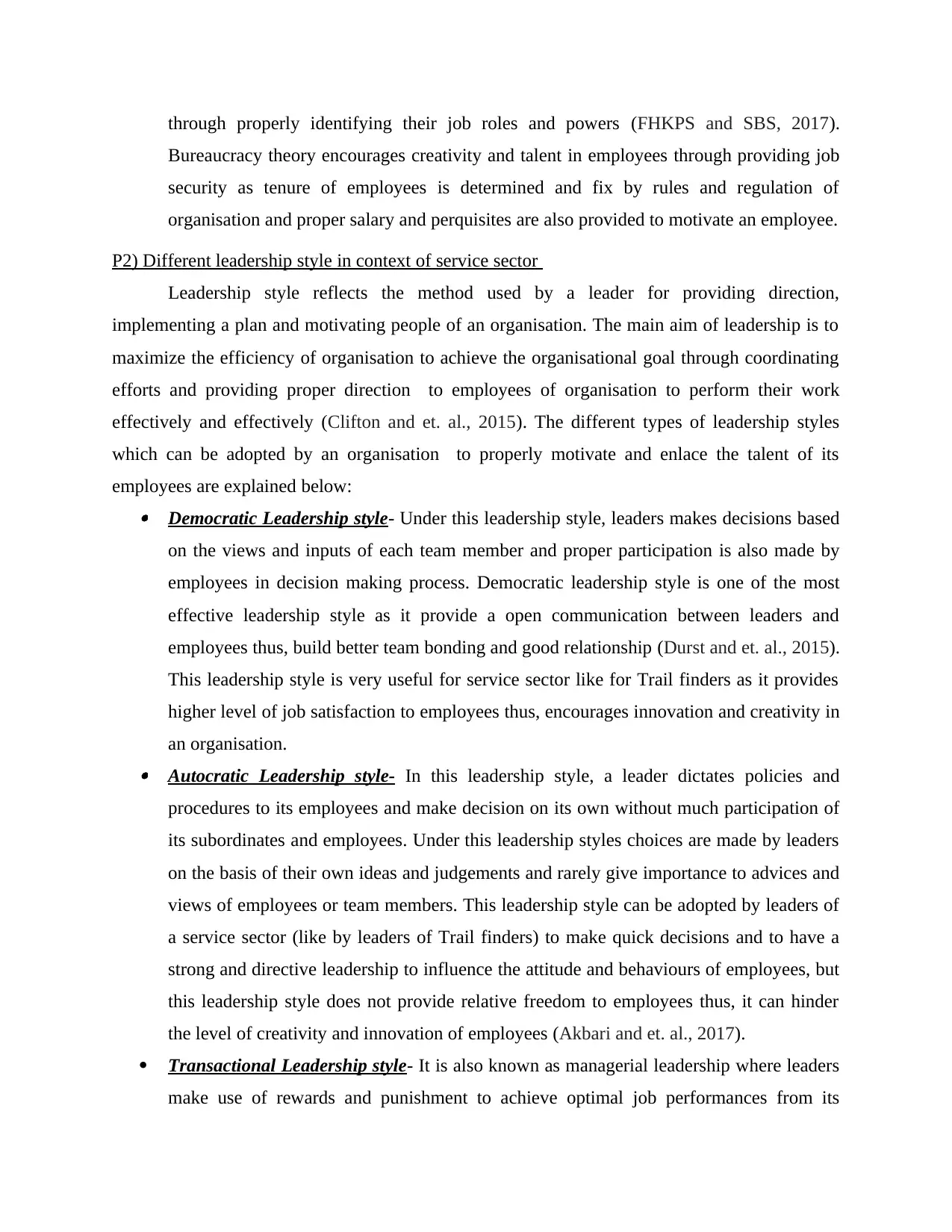
through properly identifying their job roles and powers (FHKPS and SBS, 2017).
Bureaucracy theory encourages creativity and talent in employees through providing job
security as tenure of employees is determined and fix by rules and regulation of
organisation and proper salary and perquisites are also provided to motivate an employee.
P2) Different leadership style in context of service sector
Leadership style reflects the method used by a leader for providing direction,
implementing a plan and motivating people of an organisation. The main aim of leadership is to
maximize the efficiency of organisation to achieve the organisational goal through coordinating
efforts and providing proper direction to employees of organisation to perform their work
effectively and effectively (Clifton and et. al., 2015). The different types of leadership styles
which can be adopted by an organisation to properly motivate and enlace the talent of its
employees are explained below: Democratic Leadership style- Under this leadership style, leaders makes decisions based
on the views and inputs of each team member and proper participation is also made by
employees in decision making process. Democratic leadership style is one of the most
effective leadership style as it provide a open communication between leaders and
employees thus, build better team bonding and good relationship (Durst and et. al., 2015).
This leadership style is very useful for service sector like for Trail finders as it provides
higher level of job satisfaction to employees thus, encourages innovation and creativity in
an organisation. Autocratic Leadership style- In this leadership style, a leader dictates policies and
procedures to its employees and make decision on its own without much participation of
its subordinates and employees. Under this leadership styles choices are made by leaders
on the basis of their own ideas and judgements and rarely give importance to advices and
views of employees or team members. This leadership style can be adopted by leaders of
a service sector (like by leaders of Trail finders) to make quick decisions and to have a
strong and directive leadership to influence the attitude and behaviours of employees, but
this leadership style does not provide relative freedom to employees thus, it can hinder
the level of creativity and innovation of employees (Akbari and et. al., 2017).
Transactional Leadership style- It is also known as managerial leadership where leaders
make use of rewards and punishment to achieve optimal job performances from its
Bureaucracy theory encourages creativity and talent in employees through providing job
security as tenure of employees is determined and fix by rules and regulation of
organisation and proper salary and perquisites are also provided to motivate an employee.
P2) Different leadership style in context of service sector
Leadership style reflects the method used by a leader for providing direction,
implementing a plan and motivating people of an organisation. The main aim of leadership is to
maximize the efficiency of organisation to achieve the organisational goal through coordinating
efforts and providing proper direction to employees of organisation to perform their work
effectively and effectively (Clifton and et. al., 2015). The different types of leadership styles
which can be adopted by an organisation to properly motivate and enlace the talent of its
employees are explained below: Democratic Leadership style- Under this leadership style, leaders makes decisions based
on the views and inputs of each team member and proper participation is also made by
employees in decision making process. Democratic leadership style is one of the most
effective leadership style as it provide a open communication between leaders and
employees thus, build better team bonding and good relationship (Durst and et. al., 2015).
This leadership style is very useful for service sector like for Trail finders as it provides
higher level of job satisfaction to employees thus, encourages innovation and creativity in
an organisation. Autocratic Leadership style- In this leadership style, a leader dictates policies and
procedures to its employees and make decision on its own without much participation of
its subordinates and employees. Under this leadership styles choices are made by leaders
on the basis of their own ideas and judgements and rarely give importance to advices and
views of employees or team members. This leadership style can be adopted by leaders of
a service sector (like by leaders of Trail finders) to make quick decisions and to have a
strong and directive leadership to influence the attitude and behaviours of employees, but
this leadership style does not provide relative freedom to employees thus, it can hinder
the level of creativity and innovation of employees (Akbari and et. al., 2017).
Transactional Leadership style- It is also known as managerial leadership where leaders
make use of rewards and punishment to achieve optimal job performances from its
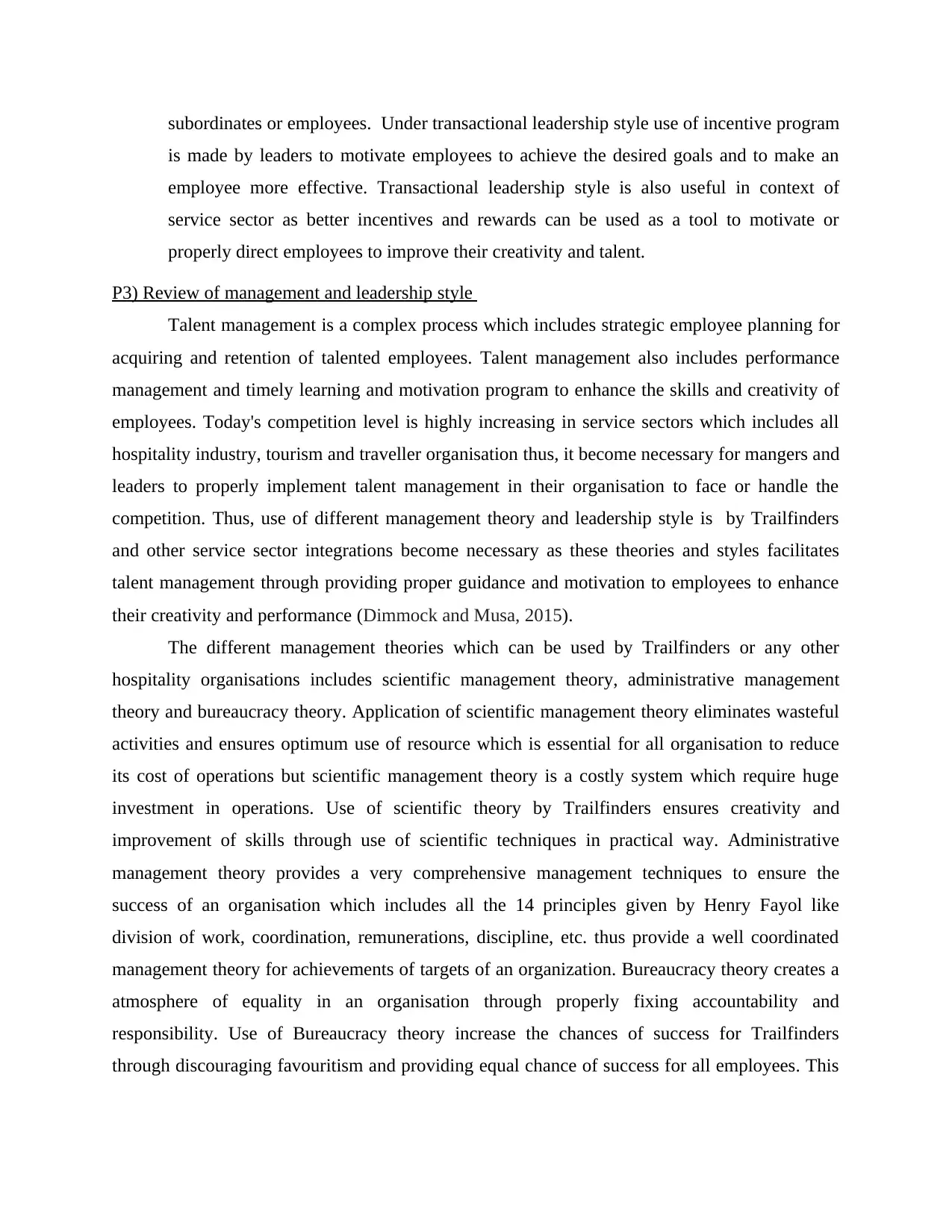
subordinates or employees. Under transactional leadership style use of incentive program
is made by leaders to motivate employees to achieve the desired goals and to make an
employee more effective. Transactional leadership style is also useful in context of
service sector as better incentives and rewards can be used as a tool to motivate or
properly direct employees to improve their creativity and talent.
P3) Review of management and leadership style
Talent management is a complex process which includes strategic employee planning for
acquiring and retention of talented employees. Talent management also includes performance
management and timely learning and motivation program to enhance the skills and creativity of
employees. Today's competition level is highly increasing in service sectors which includes all
hospitality industry, tourism and traveller organisation thus, it become necessary for mangers and
leaders to properly implement talent management in their organisation to face or handle the
competition. Thus, use of different management theory and leadership style is by Trailfinders
and other service sector integrations become necessary as these theories and styles facilitates
talent management through providing proper guidance and motivation to employees to enhance
their creativity and performance (Dimmock and Musa, 2015).
The different management theories which can be used by Trailfinders or any other
hospitality organisations includes scientific management theory, administrative management
theory and bureaucracy theory. Application of scientific management theory eliminates wasteful
activities and ensures optimum use of resource which is essential for all organisation to reduce
its cost of operations but scientific management theory is a costly system which require huge
investment in operations. Use of scientific theory by Trailfinders ensures creativity and
improvement of skills through use of scientific techniques in practical way. Administrative
management theory provides a very comprehensive management techniques to ensure the
success of an organisation which includes all the 14 principles given by Henry Fayol like
division of work, coordination, remunerations, discipline, etc. thus provide a well coordinated
management theory for achievements of targets of an organization. Bureaucracy theory creates a
atmosphere of equality in an organisation through properly fixing accountability and
responsibility. Use of Bureaucracy theory increase the chances of success for Trailfinders
through discouraging favouritism and providing equal chance of success for all employees. This
is made by leaders to motivate employees to achieve the desired goals and to make an
employee more effective. Transactional leadership style is also useful in context of
service sector as better incentives and rewards can be used as a tool to motivate or
properly direct employees to improve their creativity and talent.
P3) Review of management and leadership style
Talent management is a complex process which includes strategic employee planning for
acquiring and retention of talented employees. Talent management also includes performance
management and timely learning and motivation program to enhance the skills and creativity of
employees. Today's competition level is highly increasing in service sectors which includes all
hospitality industry, tourism and traveller organisation thus, it become necessary for mangers and
leaders to properly implement talent management in their organisation to face or handle the
competition. Thus, use of different management theory and leadership style is by Trailfinders
and other service sector integrations become necessary as these theories and styles facilitates
talent management through providing proper guidance and motivation to employees to enhance
their creativity and performance (Dimmock and Musa, 2015).
The different management theories which can be used by Trailfinders or any other
hospitality organisations includes scientific management theory, administrative management
theory and bureaucracy theory. Application of scientific management theory eliminates wasteful
activities and ensures optimum use of resource which is essential for all organisation to reduce
its cost of operations but scientific management theory is a costly system which require huge
investment in operations. Use of scientific theory by Trailfinders ensures creativity and
improvement of skills through use of scientific techniques in practical way. Administrative
management theory provides a very comprehensive management techniques to ensure the
success of an organisation which includes all the 14 principles given by Henry Fayol like
division of work, coordination, remunerations, discipline, etc. thus provide a well coordinated
management theory for achievements of targets of an organization. Bureaucracy theory creates a
atmosphere of equality in an organisation through properly fixing accountability and
responsibility. Use of Bureaucracy theory increase the chances of success for Trailfinders
through discouraging favouritism and providing equal chance of success for all employees. This
⊘ This is a preview!⊘
Do you want full access?
Subscribe today to unlock all pages.

Trusted by 1+ million students worldwide
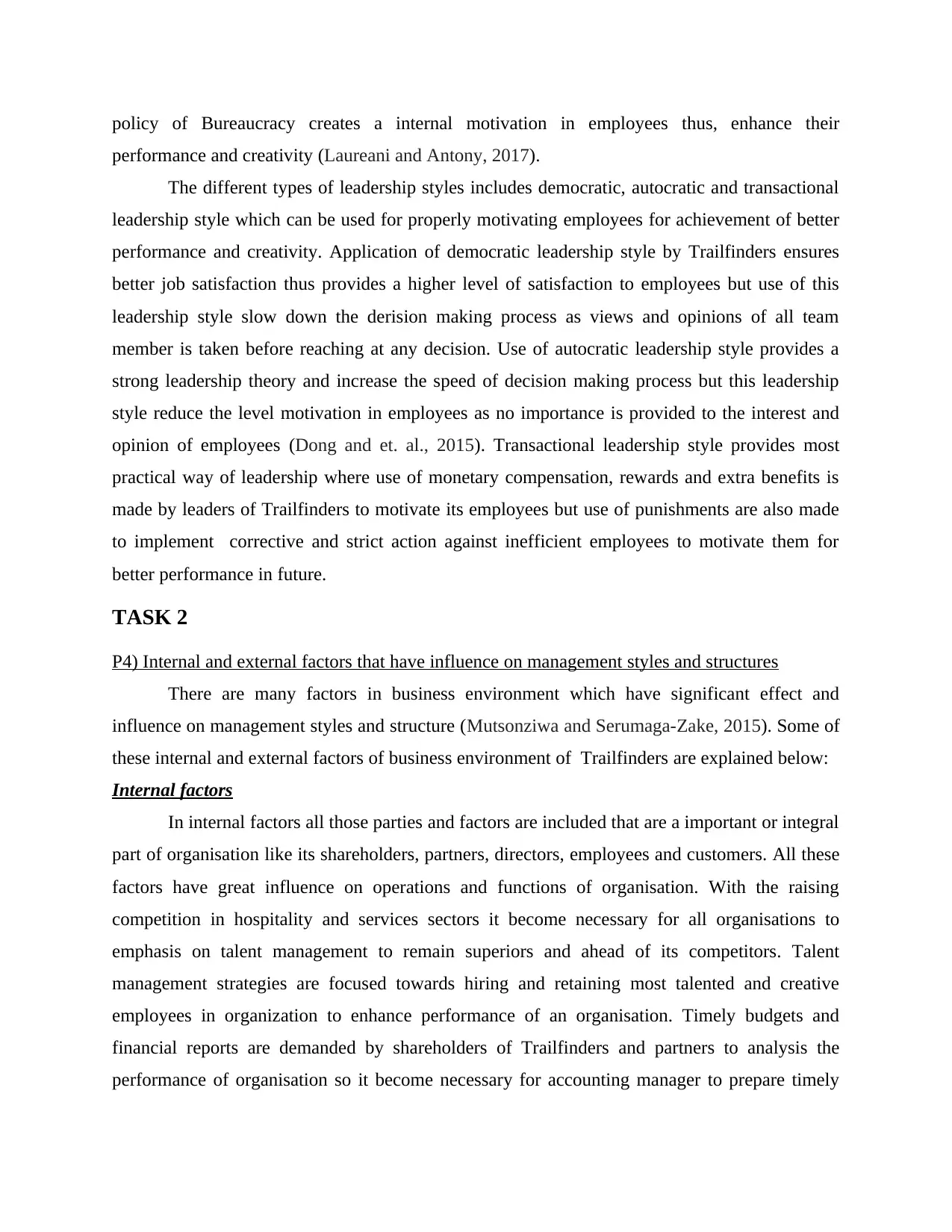
policy of Bureaucracy creates a internal motivation in employees thus, enhance their
performance and creativity (Laureani and Antony, 2017).
The different types of leadership styles includes democratic, autocratic and transactional
leadership style which can be used for properly motivating employees for achievement of better
performance and creativity. Application of democratic leadership style by Trailfinders ensures
better job satisfaction thus provides a higher level of satisfaction to employees but use of this
leadership style slow down the derision making process as views and opinions of all team
member is taken before reaching at any decision. Use of autocratic leadership style provides a
strong leadership theory and increase the speed of decision making process but this leadership
style reduce the level motivation in employees as no importance is provided to the interest and
opinion of employees (Dong and et. al., 2015). Transactional leadership style provides most
practical way of leadership where use of monetary compensation, rewards and extra benefits is
made by leaders of Trailfinders to motivate its employees but use of punishments are also made
to implement corrective and strict action against inefficient employees to motivate them for
better performance in future.
TASK 2
P4) Internal and external factors that have influence on management styles and structures
There are many factors in business environment which have significant effect and
influence on management styles and structure (Mutsonziwa and Serumaga-Zake, 2015). Some of
these internal and external factors of business environment of Trailfinders are explained below:
Internal factors
In internal factors all those parties and factors are included that are a important or integral
part of organisation like its shareholders, partners, directors, employees and customers. All these
factors have great influence on operations and functions of organisation. With the raising
competition in hospitality and services sectors it become necessary for all organisations to
emphasis on talent management to remain superiors and ahead of its competitors. Talent
management strategies are focused towards hiring and retaining most talented and creative
employees in organization to enhance performance of an organisation. Timely budgets and
financial reports are demanded by shareholders of Trailfinders and partners to analysis the
performance of organisation so it become necessary for accounting manager to prepare timely
performance and creativity (Laureani and Antony, 2017).
The different types of leadership styles includes democratic, autocratic and transactional
leadership style which can be used for properly motivating employees for achievement of better
performance and creativity. Application of democratic leadership style by Trailfinders ensures
better job satisfaction thus provides a higher level of satisfaction to employees but use of this
leadership style slow down the derision making process as views and opinions of all team
member is taken before reaching at any decision. Use of autocratic leadership style provides a
strong leadership theory and increase the speed of decision making process but this leadership
style reduce the level motivation in employees as no importance is provided to the interest and
opinion of employees (Dong and et. al., 2015). Transactional leadership style provides most
practical way of leadership where use of monetary compensation, rewards and extra benefits is
made by leaders of Trailfinders to motivate its employees but use of punishments are also made
to implement corrective and strict action against inefficient employees to motivate them for
better performance in future.
TASK 2
P4) Internal and external factors that have influence on management styles and structures
There are many factors in business environment which have significant effect and
influence on management styles and structure (Mutsonziwa and Serumaga-Zake, 2015). Some of
these internal and external factors of business environment of Trailfinders are explained below:
Internal factors
In internal factors all those parties and factors are included that are a important or integral
part of organisation like its shareholders, partners, directors, employees and customers. All these
factors have great influence on operations and functions of organisation. With the raising
competition in hospitality and services sectors it become necessary for all organisations to
emphasis on talent management to remain superiors and ahead of its competitors. Talent
management strategies are focused towards hiring and retaining most talented and creative
employees in organization to enhance performance of an organisation. Timely budgets and
financial reports are demanded by shareholders of Trailfinders and partners to analysis the
performance of organisation so it become necessary for accounting manager to prepare timely
Paraphrase This Document
Need a fresh take? Get an instant paraphrase of this document with our AI Paraphraser
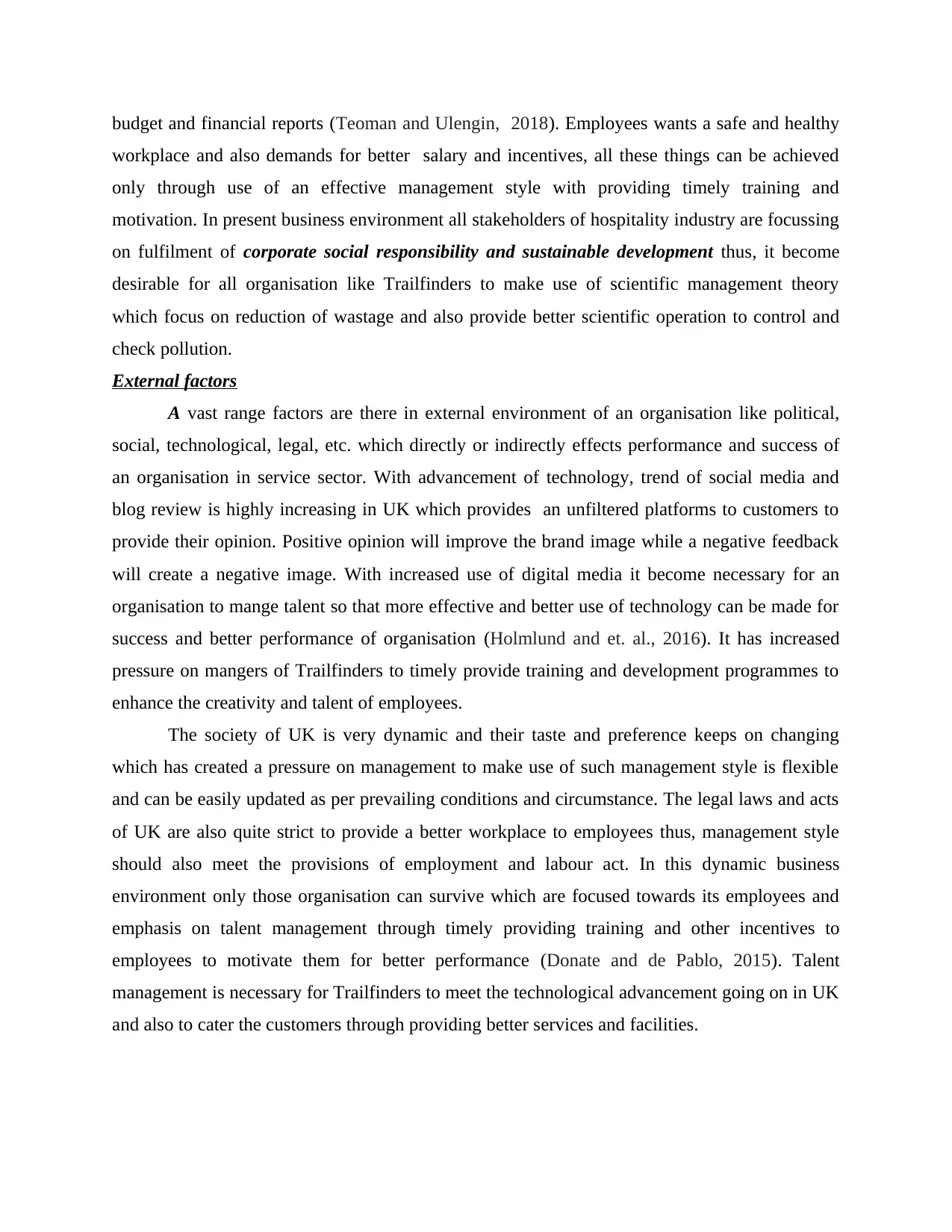
budget and financial reports (Teoman and Ulengin, 2018). Employees wants a safe and healthy
workplace and also demands for better salary and incentives, all these things can be achieved
only through use of an effective management style with providing timely training and
motivation. In present business environment all stakeholders of hospitality industry are focussing
on fulfilment of corporate social responsibility and sustainable development thus, it become
desirable for all organisation like Trailfinders to make use of scientific management theory
which focus on reduction of wastage and also provide better scientific operation to control and
check pollution.
External factors
A vast range factors are there in external environment of an organisation like political,
social, technological, legal, etc. which directly or indirectly effects performance and success of
an organisation in service sector. With advancement of technology, trend of social media and
blog review is highly increasing in UK which provides an unfiltered platforms to customers to
provide their opinion. Positive opinion will improve the brand image while a negative feedback
will create a negative image. With increased use of digital media it become necessary for an
organisation to mange talent so that more effective and better use of technology can be made for
success and better performance of organisation (Holmlund and et. al., 2016). It has increased
pressure on mangers of Trailfinders to timely provide training and development programmes to
enhance the creativity and talent of employees.
The society of UK is very dynamic and their taste and preference keeps on changing
which has created a pressure on management to make use of such management style is flexible
and can be easily updated as per prevailing conditions and circumstance. The legal laws and acts
of UK are also quite strict to provide a better workplace to employees thus, management style
should also meet the provisions of employment and labour act. In this dynamic business
environment only those organisation can survive which are focused towards its employees and
emphasis on talent management through timely providing training and other incentives to
employees to motivate them for better performance (Donate and de Pablo, 2015). Talent
management is necessary for Trailfinders to meet the technological advancement going on in UK
and also to cater the customers through providing better services and facilities.
workplace and also demands for better salary and incentives, all these things can be achieved
only through use of an effective management style with providing timely training and
motivation. In present business environment all stakeholders of hospitality industry are focussing
on fulfilment of corporate social responsibility and sustainable development thus, it become
desirable for all organisation like Trailfinders to make use of scientific management theory
which focus on reduction of wastage and also provide better scientific operation to control and
check pollution.
External factors
A vast range factors are there in external environment of an organisation like political,
social, technological, legal, etc. which directly or indirectly effects performance and success of
an organisation in service sector. With advancement of technology, trend of social media and
blog review is highly increasing in UK which provides an unfiltered platforms to customers to
provide their opinion. Positive opinion will improve the brand image while a negative feedback
will create a negative image. With increased use of digital media it become necessary for an
organisation to mange talent so that more effective and better use of technology can be made for
success and better performance of organisation (Holmlund and et. al., 2016). It has increased
pressure on mangers of Trailfinders to timely provide training and development programmes to
enhance the creativity and talent of employees.
The society of UK is very dynamic and their taste and preference keeps on changing
which has created a pressure on management to make use of such management style is flexible
and can be easily updated as per prevailing conditions and circumstance. The legal laws and acts
of UK are also quite strict to provide a better workplace to employees thus, management style
should also meet the provisions of employment and labour act. In this dynamic business
environment only those organisation can survive which are focused towards its employees and
emphasis on talent management through timely providing training and other incentives to
employees to motivate them for better performance (Donate and de Pablo, 2015). Talent
management is necessary for Trailfinders to meet the technological advancement going on in UK
and also to cater the customers through providing better services and facilities.
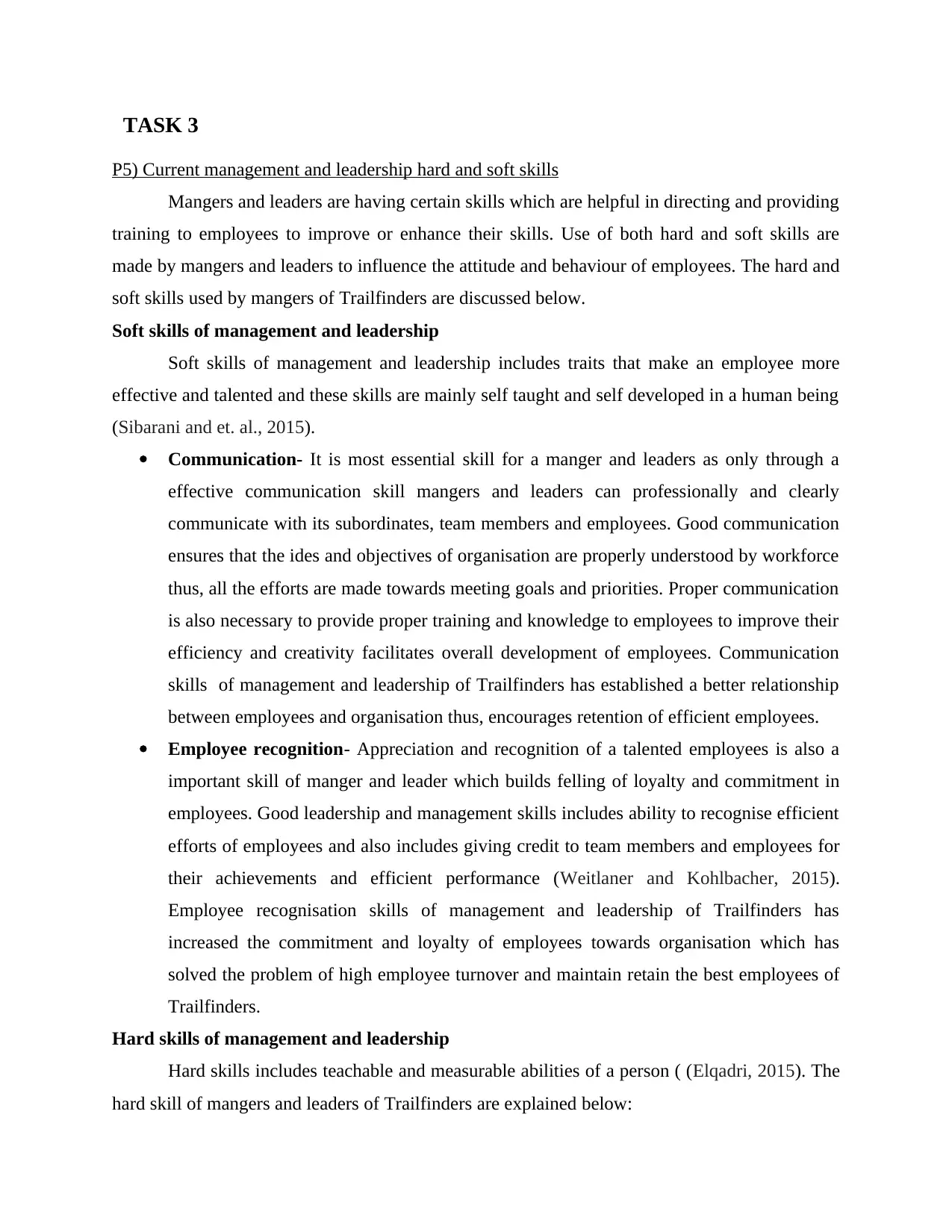
TASK 3
P5) Current management and leadership hard and soft skills
Mangers and leaders are having certain skills which are helpful in directing and providing
training to employees to improve or enhance their skills. Use of both hard and soft skills are
made by mangers and leaders to influence the attitude and behaviour of employees. The hard and
soft skills used by mangers of Trailfinders are discussed below.
Soft skills of management and leadership
Soft skills of management and leadership includes traits that make an employee more
effective and talented and these skills are mainly self taught and self developed in a human being
(Sibarani and et. al., 2015).
Communication- It is most essential skill for a manger and leaders as only through a
effective communication skill mangers and leaders can professionally and clearly
communicate with its subordinates, team members and employees. Good communication
ensures that the ides and objectives of organisation are properly understood by workforce
thus, all the efforts are made towards meeting goals and priorities. Proper communication
is also necessary to provide proper training and knowledge to employees to improve their
efficiency and creativity facilitates overall development of employees. Communication
skills of management and leadership of Trailfinders has established a better relationship
between employees and organisation thus, encourages retention of efficient employees.
Employee recognition- Appreciation and recognition of a talented employees is also a
important skill of manger and leader which builds felling of loyalty and commitment in
employees. Good leadership and management skills includes ability to recognise efficient
efforts of employees and also includes giving credit to team members and employees for
their achievements and efficient performance (Weitlaner and Kohlbacher, 2015).
Employee recognisation skills of management and leadership of Trailfinders has
increased the commitment and loyalty of employees towards organisation which has
solved the problem of high employee turnover and maintain retain the best employees of
Trailfinders.
Hard skills of management and leadership
Hard skills includes teachable and measurable abilities of a person ( (Elqadri, 2015). The
hard skill of mangers and leaders of Trailfinders are explained below:
P5) Current management and leadership hard and soft skills
Mangers and leaders are having certain skills which are helpful in directing and providing
training to employees to improve or enhance their skills. Use of both hard and soft skills are
made by mangers and leaders to influence the attitude and behaviour of employees. The hard and
soft skills used by mangers of Trailfinders are discussed below.
Soft skills of management and leadership
Soft skills of management and leadership includes traits that make an employee more
effective and talented and these skills are mainly self taught and self developed in a human being
(Sibarani and et. al., 2015).
Communication- It is most essential skill for a manger and leaders as only through a
effective communication skill mangers and leaders can professionally and clearly
communicate with its subordinates, team members and employees. Good communication
ensures that the ides and objectives of organisation are properly understood by workforce
thus, all the efforts are made towards meeting goals and priorities. Proper communication
is also necessary to provide proper training and knowledge to employees to improve their
efficiency and creativity facilitates overall development of employees. Communication
skills of management and leadership of Trailfinders has established a better relationship
between employees and organisation thus, encourages retention of efficient employees.
Employee recognition- Appreciation and recognition of a talented employees is also a
important skill of manger and leader which builds felling of loyalty and commitment in
employees. Good leadership and management skills includes ability to recognise efficient
efforts of employees and also includes giving credit to team members and employees for
their achievements and efficient performance (Weitlaner and Kohlbacher, 2015).
Employee recognisation skills of management and leadership of Trailfinders has
increased the commitment and loyalty of employees towards organisation which has
solved the problem of high employee turnover and maintain retain the best employees of
Trailfinders.
Hard skills of management and leadership
Hard skills includes teachable and measurable abilities of a person ( (Elqadri, 2015). The
hard skill of mangers and leaders of Trailfinders are explained below:
⊘ This is a preview!⊘
Do you want full access?
Subscribe today to unlock all pages.

Trusted by 1+ million students worldwide
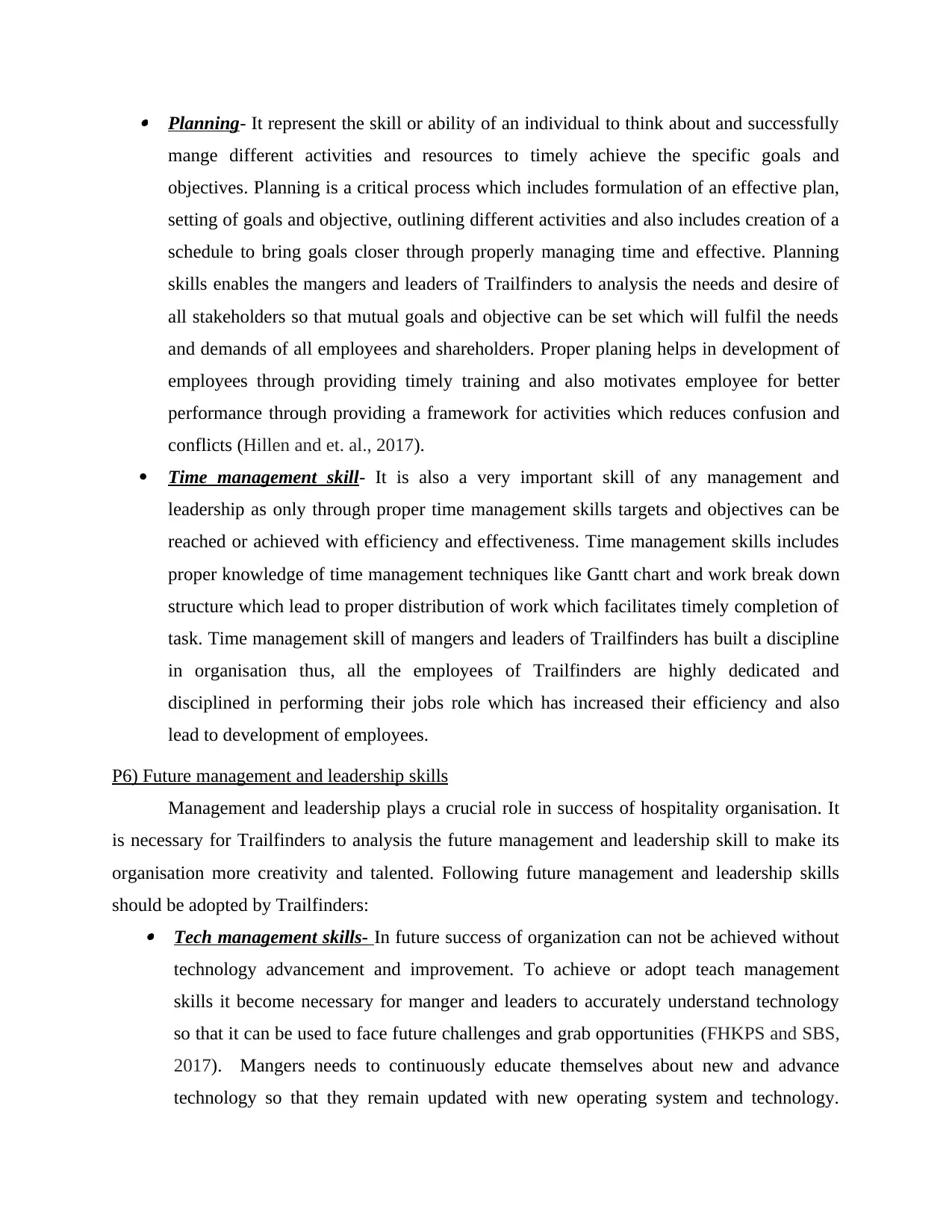
Planning- It represent the skill or ability of an individual to think about and successfully
mange different activities and resources to timely achieve the specific goals and
objectives. Planning is a critical process which includes formulation of an effective plan,
setting of goals and objective, outlining different activities and also includes creation of a
schedule to bring goals closer through properly managing time and effective. Planning
skills enables the mangers and leaders of Trailfinders to analysis the needs and desire of
all stakeholders so that mutual goals and objective can be set which will fulfil the needs
and demands of all employees and shareholders. Proper planing helps in development of
employees through providing timely training and also motivates employee for better
performance through providing a framework for activities which reduces confusion and
conflicts (Hillen and et. al., 2017).
Time management skill- It is also a very important skill of any management and
leadership as only through proper time management skills targets and objectives can be
reached or achieved with efficiency and effectiveness. Time management skills includes
proper knowledge of time management techniques like Gantt chart and work break down
structure which lead to proper distribution of work which facilitates timely completion of
task. Time management skill of mangers and leaders of Trailfinders has built a discipline
in organisation thus, all the employees of Trailfinders are highly dedicated and
disciplined in performing their jobs role which has increased their efficiency and also
lead to development of employees.
P6) Future management and leadership skills
Management and leadership plays a crucial role in success of hospitality organisation. It
is necessary for Trailfinders to analysis the future management and leadership skill to make its
organisation more creativity and talented. Following future management and leadership skills
should be adopted by Trailfinders: Tech management skills- In future success of organization can not be achieved without
technology advancement and improvement. To achieve or adopt teach management
skills it become necessary for manger and leaders to accurately understand technology
so that it can be used to face future challenges and grab opportunities (FHKPS and SBS,
2017). Mangers needs to continuously educate themselves about new and advance
technology so that they remain updated with new operating system and technology.
mange different activities and resources to timely achieve the specific goals and
objectives. Planning is a critical process which includes formulation of an effective plan,
setting of goals and objective, outlining different activities and also includes creation of a
schedule to bring goals closer through properly managing time and effective. Planning
skills enables the mangers and leaders of Trailfinders to analysis the needs and desire of
all stakeholders so that mutual goals and objective can be set which will fulfil the needs
and demands of all employees and shareholders. Proper planing helps in development of
employees through providing timely training and also motivates employee for better
performance through providing a framework for activities which reduces confusion and
conflicts (Hillen and et. al., 2017).
Time management skill- It is also a very important skill of any management and
leadership as only through proper time management skills targets and objectives can be
reached or achieved with efficiency and effectiveness. Time management skills includes
proper knowledge of time management techniques like Gantt chart and work break down
structure which lead to proper distribution of work which facilitates timely completion of
task. Time management skill of mangers and leaders of Trailfinders has built a discipline
in organisation thus, all the employees of Trailfinders are highly dedicated and
disciplined in performing their jobs role which has increased their efficiency and also
lead to development of employees.
P6) Future management and leadership skills
Management and leadership plays a crucial role in success of hospitality organisation. It
is necessary for Trailfinders to analysis the future management and leadership skill to make its
organisation more creativity and talented. Following future management and leadership skills
should be adopted by Trailfinders: Tech management skills- In future success of organization can not be achieved without
technology advancement and improvement. To achieve or adopt teach management
skills it become necessary for manger and leaders to accurately understand technology
so that it can be used to face future challenges and grab opportunities (FHKPS and SBS,
2017). Mangers needs to continuously educate themselves about new and advance
technology so that they remain updated with new operating system and technology.
Paraphrase This Document
Need a fresh take? Get an instant paraphrase of this document with our AI Paraphraser
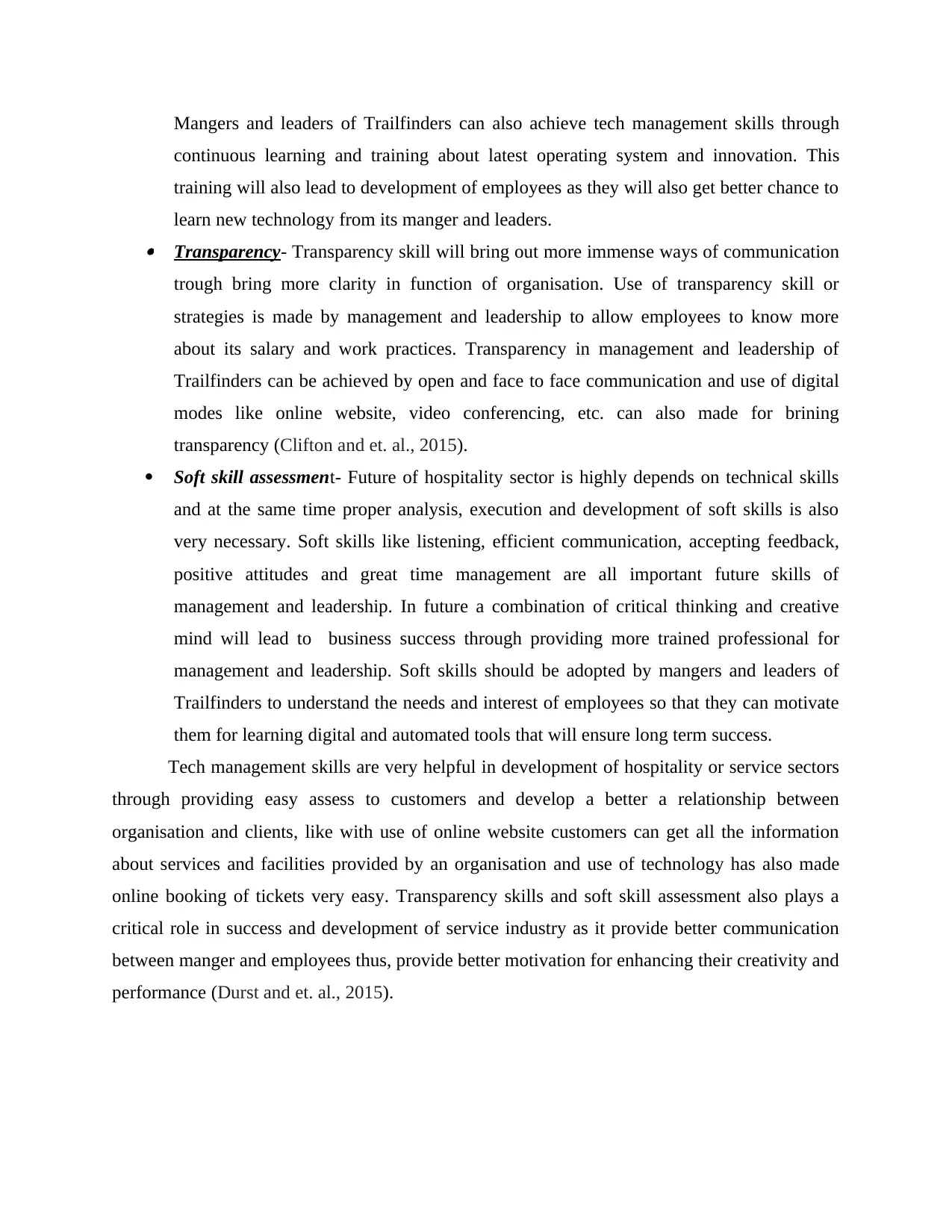
Mangers and leaders of Trailfinders can also achieve tech management skills through
continuous learning and training about latest operating system and innovation. This
training will also lead to development of employees as they will also get better chance to
learn new technology from its manger and leaders. Transparency- Transparency skill will bring out more immense ways of communication
trough bring more clarity in function of organisation. Use of transparency skill or
strategies is made by management and leadership to allow employees to know more
about its salary and work practices. Transparency in management and leadership of
Trailfinders can be achieved by open and face to face communication and use of digital
modes like online website, video conferencing, etc. can also made for brining
transparency (Clifton and et. al., 2015).
Soft skill assessment- Future of hospitality sector is highly depends on technical skills
and at the same time proper analysis, execution and development of soft skills is also
very necessary. Soft skills like listening, efficient communication, accepting feedback,
positive attitudes and great time management are all important future skills of
management and leadership. In future a combination of critical thinking and creative
mind will lead to business success through providing more trained professional for
management and leadership. Soft skills should be adopted by mangers and leaders of
Trailfinders to understand the needs and interest of employees so that they can motivate
them for learning digital and automated tools that will ensure long term success.
Tech management skills are very helpful in development of hospitality or service sectors
through providing easy assess to customers and develop a better a relationship between
organisation and clients, like with use of online website customers can get all the information
about services and facilities provided by an organisation and use of technology has also made
online booking of tickets very easy. Transparency skills and soft skill assessment also plays a
critical role in success and development of service industry as it provide better communication
between manger and employees thus, provide better motivation for enhancing their creativity and
performance (Durst and et. al., 2015).
continuous learning and training about latest operating system and innovation. This
training will also lead to development of employees as they will also get better chance to
learn new technology from its manger and leaders. Transparency- Transparency skill will bring out more immense ways of communication
trough bring more clarity in function of organisation. Use of transparency skill or
strategies is made by management and leadership to allow employees to know more
about its salary and work practices. Transparency in management and leadership of
Trailfinders can be achieved by open and face to face communication and use of digital
modes like online website, video conferencing, etc. can also made for brining
transparency (Clifton and et. al., 2015).
Soft skill assessment- Future of hospitality sector is highly depends on technical skills
and at the same time proper analysis, execution and development of soft skills is also
very necessary. Soft skills like listening, efficient communication, accepting feedback,
positive attitudes and great time management are all important future skills of
management and leadership. In future a combination of critical thinking and creative
mind will lead to business success through providing more trained professional for
management and leadership. Soft skills should be adopted by mangers and leaders of
Trailfinders to understand the needs and interest of employees so that they can motivate
them for learning digital and automated tools that will ensure long term success.
Tech management skills are very helpful in development of hospitality or service sectors
through providing easy assess to customers and develop a better a relationship between
organisation and clients, like with use of online website customers can get all the information
about services and facilities provided by an organisation and use of technology has also made
online booking of tickets very easy. Transparency skills and soft skill assessment also plays a
critical role in success and development of service industry as it provide better communication
between manger and employees thus, provide better motivation for enhancing their creativity and
performance (Durst and et. al., 2015).
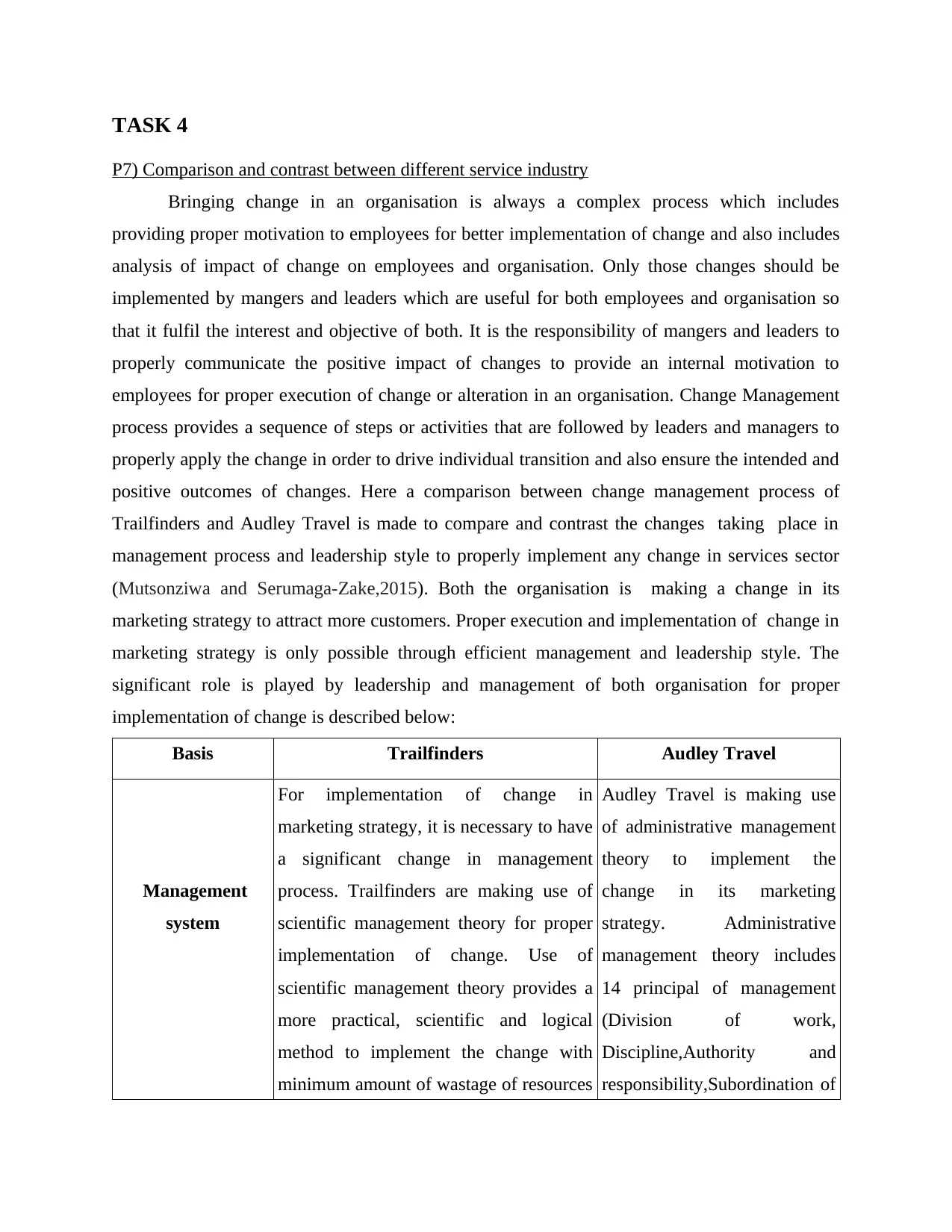
TASK 4
P7) Comparison and contrast between different service industry
Bringing change in an organisation is always a complex process which includes
providing proper motivation to employees for better implementation of change and also includes
analysis of impact of change on employees and organisation. Only those changes should be
implemented by mangers and leaders which are useful for both employees and organisation so
that it fulfil the interest and objective of both. It is the responsibility of mangers and leaders to
properly communicate the positive impact of changes to provide an internal motivation to
employees for proper execution of change or alteration in an organisation. Change Management
process provides a sequence of steps or activities that are followed by leaders and managers to
properly apply the change in order to drive individual transition and also ensure the intended and
positive outcomes of changes. Here a comparison between change management process of
Trailfinders and Audley Travel is made to compare and contrast the changes taking place in
management process and leadership style to properly implement any change in services sector
(Mutsonziwa and Serumaga-Zake,2015). Both the organisation is making a change in its
marketing strategy to attract more customers. Proper execution and implementation of change in
marketing strategy is only possible through efficient management and leadership style. The
significant role is played by leadership and management of both organisation for proper
implementation of change is described below:
Basis Trailfinders Audley Travel
Management
system
For implementation of change in
marketing strategy, it is necessary to have
a significant change in management
process. Trailfinders are making use of
scientific management theory for proper
implementation of change. Use of
scientific management theory provides a
more practical, scientific and logical
method to implement the change with
minimum amount of wastage of resources
Audley Travel is making use
of administrative management
theory to implement the
change in its marketing
strategy. Administrative
management theory includes
14 principal of management
(Division of work,
Discipline,Authority and
responsibility,Subordination of
P7) Comparison and contrast between different service industry
Bringing change in an organisation is always a complex process which includes
providing proper motivation to employees for better implementation of change and also includes
analysis of impact of change on employees and organisation. Only those changes should be
implemented by mangers and leaders which are useful for both employees and organisation so
that it fulfil the interest and objective of both. It is the responsibility of mangers and leaders to
properly communicate the positive impact of changes to provide an internal motivation to
employees for proper execution of change or alteration in an organisation. Change Management
process provides a sequence of steps or activities that are followed by leaders and managers to
properly apply the change in order to drive individual transition and also ensure the intended and
positive outcomes of changes. Here a comparison between change management process of
Trailfinders and Audley Travel is made to compare and contrast the changes taking place in
management process and leadership style to properly implement any change in services sector
(Mutsonziwa and Serumaga-Zake,2015). Both the organisation is making a change in its
marketing strategy to attract more customers. Proper execution and implementation of change in
marketing strategy is only possible through efficient management and leadership style. The
significant role is played by leadership and management of both organisation for proper
implementation of change is described below:
Basis Trailfinders Audley Travel
Management
system
For implementation of change in
marketing strategy, it is necessary to have
a significant change in management
process. Trailfinders are making use of
scientific management theory for proper
implementation of change. Use of
scientific management theory provides a
more practical, scientific and logical
method to implement the change with
minimum amount of wastage of resources
Audley Travel is making use
of administrative management
theory to implement the
change in its marketing
strategy. Administrative
management theory includes
14 principal of management
(Division of work,
Discipline,Authority and
responsibility,Subordination of
⊘ This is a preview!⊘
Do you want full access?
Subscribe today to unlock all pages.

Trusted by 1+ million students worldwide
1 out of 16
Related Documents
Your All-in-One AI-Powered Toolkit for Academic Success.
+13062052269
info@desklib.com
Available 24*7 on WhatsApp / Email
![[object Object]](/_next/static/media/star-bottom.7253800d.svg)
Unlock your academic potential
Copyright © 2020–2026 A2Z Services. All Rights Reserved. Developed and managed by ZUCOL.




